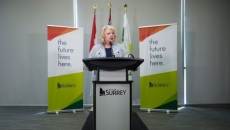When August rolled around, April Hicke realized the $100 she typically gives her 13-year-old son to update his wardrobe in time for school to start was no longer enough.
"Even on the sale racks, a pair of sweatpants at SportChek, they're still $25 a pair. You used to be able to go and buy a pair of sweatpants for $10," said the Calgary-based mother of two. "I am shocked at the (price) increase of kids' clothes."
Hicke increased her son's budget to $200, taught him about looking for deals and used an annual Patagonia sale and resale sites like Poshmark to find savings on such big-ticket items as winter coats.
While it wasn't the first time she has taken these steps to reduce her back-to-school shopping bill, the strategies she and other parents are using come with a renewed importance this year because even as inflation has eased, Canadians aren't seeing any meaningful relief in their expenses.
The cost of staples like food have soared, leaving less spare cash for binders, books and new school looks.
Despite many having less or no wiggle room in their budgets, 85.7 per cent of the 8,977 Canadians surveyed on behalf of the Retail Council of Canada in July predicted they would spend as much — or more — on back to school than they did last year.
About 73 per cent of those respondents planned to spend more than $50 and about 43 per cent said they would exceed $100.
An increasing number planned to shop early, too.
"They're not just going out to stores and making those impulse buys. They're really putting a lot more thought and mindfulness into what they are purchasing and what they need," said Michelle Wasylyshen, a spokesperson for the council.
"What can they maybe get by without this year? What did they buy last year that can make it through another year?"
The survey found the top categories shoppers plan to spend on are school supplies, clothing, books and then electronics.
For items kids can't do without, parents said they were scouring flyers for deals, browsing clearance racks and turning to second-hand stores or social media groups.
A survey of 1,014 Canadians conducted on behalf of NerdWallet in July found 53 per cent of back-to-school shoppers would seek sales, 26 per cent would use coupons and 20 per cent planned to thrift.
About 32 per cent said they would buy all new school supplies, but that doesn't mean saving wasn't still a priority for them.
"Value is top of mind for our parent customers when they shop with us and more so in this year than ever before," said Rania Husseini, Indigo Books & Music Inc.'s senior vice-president of print, in an email.
So far this back-to-school season, she has noticed a higher proportion of sales coming from books that are at "an accessible price point."
Walmart Canada has seen a lot of demand this year for wireless headphones, laptops and printers.
Sally Chan, the retail giant's director of strategic commercial planning, attributed some of the spike to the rise in online schooling that the COVID-19 pandemic brought, introducing many parents to a whole new level of education costs.
"It's the demand for technology that's really kind of stretching the parent's budget a little bit more than in the past," she said.
To reduce the hit to her wallet as much as possible, Alison Balfour planned to take a wait-and-see approach to back to school shopping.
Once classes begin for her two boys and they get a better sense of their needs and tastes, the Calgary mother said she would begin shopping. By then, she hopes prices will have come down from the "exponentially expensive" levels she has seen recently.
"I am not seeing a lot of savings, to be honest," she said.
"If we are seeing inflation go down and the economy is supposed to be recovering, why are we still seeing these costs especially in grocery stores and things for school? Nothing seems to be going down."
Hicke had a similar observation. The packs of three T-shirts she used to buy her sons at Zara now cost $40 instead of $25 and shoes, pants and other apparel essentials have risen, too.
A silver lining, she said, was that her younger boy is still "not picky" about brands so she can find savings in the dollar store aisles.
"I can tell him go get all the pencils and pens that you want, and he'll just go and grab everything he needs and he's always sub-$10."






